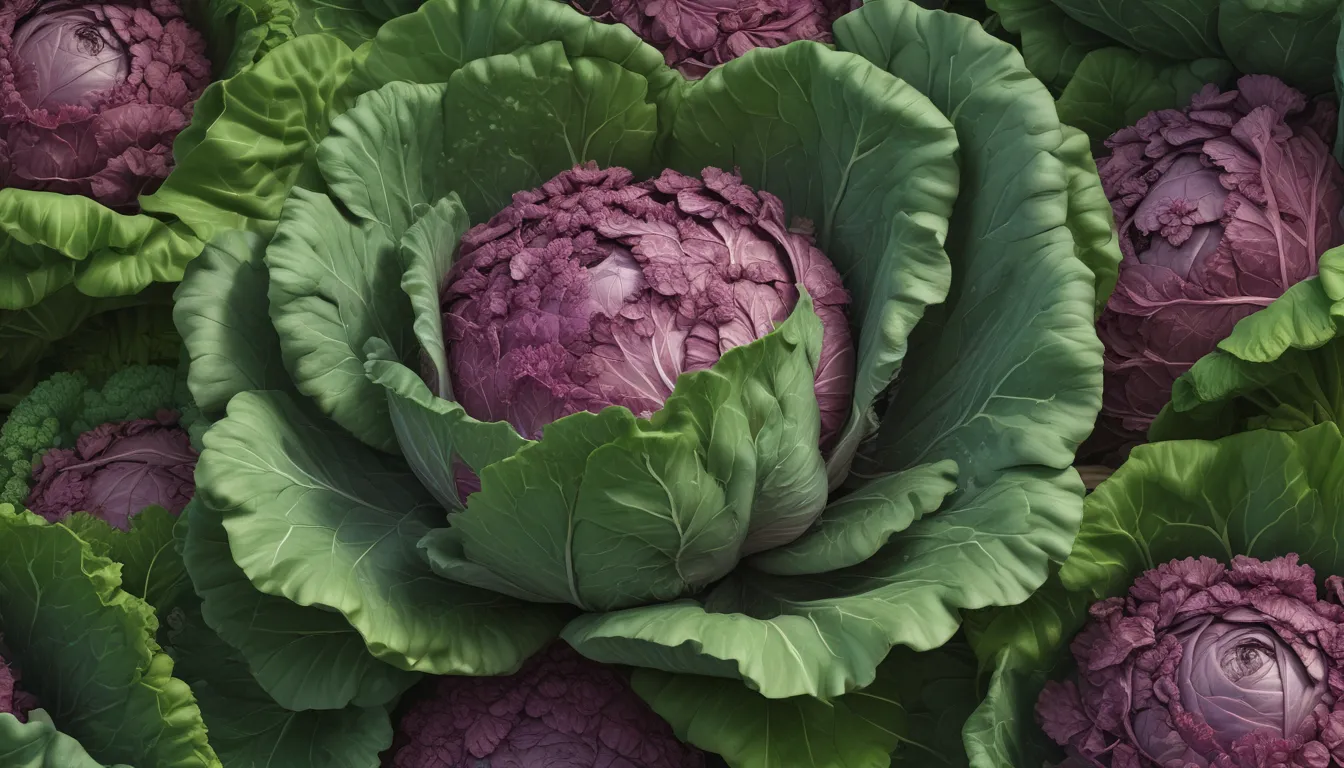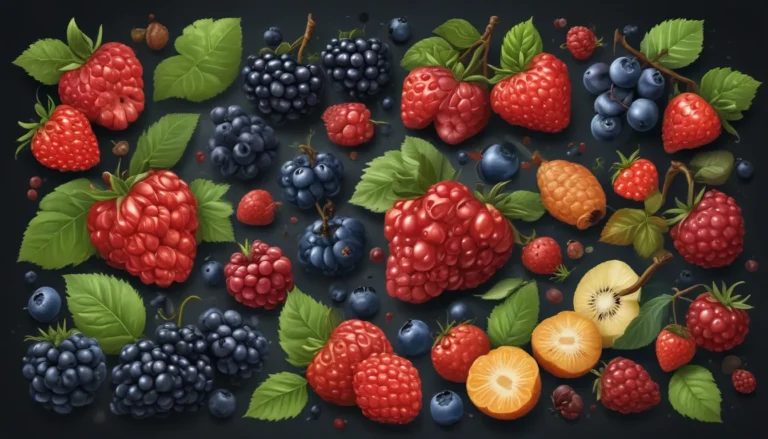The pictures we use in our articles might not show exactly what the words say. We choose these pictures to make you interested in reading more. The pictures work together with the words but don’t take their place. The words still tell you the important facts.
Are you a fan of nutritious vegetables that not only taste delicious but also offer a plethora of health benefits? If so, then Brassica, also known as the cruciferous family, is sure to capture your attention. From broccoli to kale, and Brussels sprouts to cauliflower, Brassica crops are not only versatile in the kitchen but are also packed with essential nutrients that contribute to overall well-being.
In this article, we will unravel the fascinating world of Brassica and reveal 11 astounding facts about these remarkable plants. Whether you're an avid gardener, someone who prioritizes nutrition, or simply curious about the wonders of nature, you'll be intrigued by the incredible attributes and benefits of Brassica.
So, let's embark on a journey to expand your knowledge and explore some surprising facts about Brassica that will inspire you to incorporate these superstars of the vegetable kingdom into your daily diet.
Key Takeaways:
- Brassica vegetables, like broccoli and kale, are nutritional powerhouses packed with vitamins and antioxidants that promote good health and may help prevent diseases like cancer and heart disease.
- With their ancient origins and genetic diversity, Brassica vegetables offer not only delicious flavors but also brain-boosting benefits and potential anti-cancer properties, making them a remarkable addition to any diet.
Diverse Family of Vegetables
Brassica encompasses a diverse family of vegetables that includes popular members such as broccoli, cauliflower, kale, cabbage, Brussels sprouts, and more. Not only are these vegetables delicious, but they are also packed with essential nutrients that contribute to overall health and well-being.
Nutritional Powerhouses
Brassica vegetables are true nutritional powerhouses. Rich in vitamins, minerals, and antioxidants, these vegetables play a vital role in promoting good health and preventing chronic diseases such as cancer and heart disease.
Low in Calories, High in Fiber
One of the remarkable aspects of Brassica vegetables is their low-calorie content, making them an excellent choice for weight-conscious individuals. Furthermore, these vegetables are high in fiber, which aids in digestion and promotes a healthy gut.
Remarkable Versatility in the Kitchen
Brassica vegetables offer incredible versatility in the kitchen. Whether you prefer steaming, roasting, stir-frying, or sautéing, there are endless ways to incorporate these vegetables into your meals. Their unique flavors and textures make them a favorite among chefs and home cooks alike.
Ancient Origins
The history of the Brassica family dates back thousands of years, showcasing its ancient origins. Cultivated and consumed by various civilizations throughout history, Brassica has been an integral part of human diet and culture.
Cold Hardy Plants
Many Brassica vegetables, such as kale and Brussels sprouts, are cold-hardy plants that can withstand frost and even improve in flavor after exposure to cold temperatures. This resilience makes them ideal choices for fall and winter gardening.
High in Vitamin C
Brassica vegetables are excellent sources of vitamin C, a crucial nutrient that boosts the immune system, promotes collagen production, and supports overall skin health.
Phytochemical Powerhouses
Brassica vegetables contain an array of phytochemicals, including glucosinolates, which have been linked to potential anti-cancer properties. These compounds not only contribute to the distinctive flavors and aromas of Brassica vegetables but also offer significant health benefits.
Brassicas for Brain Health
Studies suggest that Brassica vegetables, particularly broccoli and kale, may have brain-boosting benefits. Rich in antioxidants and compounds that protect brain cells from damage, Brassica vegetables can potentially reduce the risk of cognitive decline.
World’s Oldest Cultivated Crop
Brassica rapa, commonly known as turnip, is believed to be one of the world's oldest cultivated crops, with a history dating back over 4,000 years. This long-standing cultivation highlights the resiliency and importance of Brassica in human civilizations.
Genetic Diversity and Research
Brassica's genetic diversity has attracted significant attention from plant geneticists and researchers, making it an excellent model for studying plant biology, crop improvement, and the development of new and improved Brassica varieties.
With these 11 astounding facts about Brassica, it becomes clear why this remarkable plant family holds such a prominent place in our diet, health, and culinary traditions. Incorporating Brassica vegetables into your meals not only provides delicious flavors but also brings a wide range of nutritional benefits that support a healthy lifestyle.
Conclusion
In conclusion, Brassica, also known as the mustard family, is a captivating group of plants that offer numerous benefits and surprises. From their broad range of species to their nutritional value and versatility in the kitchen, there is so much to explore and appreciate about Brassica. Whether you're a plant enthusiast or simply a food lover, discovering these facts about Brassica can deepen your admiration for this amazing plant family.
With their rich history, medicinal properties, and economic importance, Brassica plants continue to play a significant role in our lives. Whether you savor the pungent kick of mustard or delight in the crispness of broccoli, be sure to include Brassica in your diet for their incredible health benefits. The next time you encounter a Brassica plant, take a moment to contemplate its intricacies and the wonders it brings to our world.
FAQs
Q: What are some common Brassica plants?
A: Some common Brassica plants include broccoli, cauliflower, cabbage, kale, Brussels sprouts, and mustard greens.
Q: Are Brassica plants easy to grow?
A: Yes, most Brassica plants are relatively easy to grow, requiring well-drained soil, ample sunlight, and regular watering.
Q: Are Brassica plants good for our health?
A: Yes, Brassica plants are highly nutritious, packed with vitamins, minerals, and antioxidants that offer numerous health benefits, including boosting the immune system and reducing the risk of chronic diseases.
Q: Can I eat all parts of Brassica plants?
A: Yes, different parts of Brassica plants are edible. For example, the leaves of kale and mustard greens can be eaten, while the flower heads of broccoli and cauliflower are commonly consumed.
Q: Are there any specific cooking methods for Brassica plants?
A: Brassica plants can be cooked in a variety of ways, including steaming, sautéing, roasting, and even raw in salads. The cooking method may vary based on personal preference and the specific Brassica plant being used.
Q: Do Brassica plants require any special care?
A: While Brassica plants are relatively easy to grow, they may require protection from certain pests, such as cabbage worms. Additionally, regular watering and proper spacing are essential for their optimal growth.
Q: Can I grow Brassica plants in containers or small gardens?
A: Yes, many Brassica plants can be successfully grown in containers or small gardens. Varieties such as dwarf kale and mini cauliflower are particularly suitable for these environments.
Dive deeper into agriculture facts to gain a broader understanding of farming and food production or explore horticulture facts for insights into gardening techniques and plant cultivation. Whether you're a farmer, a gardener, or simply intrigued by the natural world, there is a wealth of knowledge waiting to be discovered.
Was this page helpful?
Our commitment to delivering trustworthy and engaging content is paramount. Each fact on our site is contributed by real users like you, bringing diverse insights and information. Our dedicated editors meticulously review each submission to ensure the highest standards of accuracy and reliability. Trust in our commitment to quality and authenticity as you explore and learn with us.






